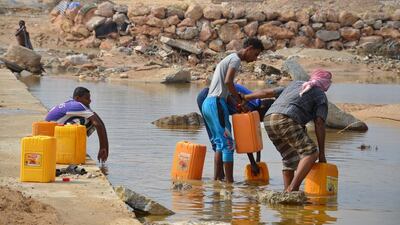GENEVA // Another tropical cyclone is heading for Yemen just days after a storm dumped several years’ worth of rain on the port city of Mukalla and left thousands homeless on the island of Socotra.
The new storm, named Megh, is brewing in the Arabian Sea and is expected to intensify into “a severe cyclonic storm” over the next 24 hours, with wind speeds of up to 100 kilometres per hour, the World Meteorological Organisation (WMO) said.
Megh is not as powerful as Chapala, which killed eight people in south-eastern Yemen this week, but is expected to slam into or pass close to the country’s already badly hit Arabian Sea island of Socotra on Sunday, WMO spokeswoman Clare Nullis said.
From Socotra, the storm is expected to weaken into a low pressure area as it moves towards mainland Yemen, but will still bring large amounts of rain to areas already devastated by Chapala.
Megh “is not nearly as intense as Chapala. It is not as big. But obviously the rainfall associated with this storm is going to make the problems caused by Chapala ... worse, and it will obviously complicate what is already a very complex humanitarian operation,” Ms Nullis said.
Tropical cyclones are extremely rare over the Arabian peninsula, and having two back-to-back was “an absolutely extraordinary event”, she said.
The storms appeared to be caused by high sea surface temperatures and a naturally occurring climate phenomenon resembling the El Nino, called the Indian Ocean Dipole, which allows low-pressure systems to move farther west over warmer water than is traditionally the case, and develop into cyclones, WMO said.
The UN’s humanitarian agency Ocha said on Friday that up to 44,000 people had already been displaced by Chapala, which made landfall in mainland Yemen on Tuesday, triggering heavy flash floods and mudslides that killed eight people, two of them children, and injured 34 others.
Earlier, Chapala severely hit Socotra, forcing the evacuation of 18,000 people on the island and completely destroying 237 homes, Ocha spokesman Jens Laerke said.
No one on the island was killed, despite initial reports that three people had died, he said.
The island has received 80 tonnes of relief supplies from the Emirates Red Crescent and the Khalifa Foundation, including food, medical supplies, tents, blankets and clothing.
On mainland Yemen, the coastal road between Aden and the Hadramawt provincial capital Mukalla, which serves as a main transport route for aid supplies, had been damaged by flooding, he said.
Providing relief was also complicated by the fact that some affected areas are held by armed groups, including Al Qaeda.
Getting fresh water in was a top priority, he said, adding that Ocha had set up a special 11-man support and response team, based in Oman, to help with the relief efforts.
* Agence France-Presse

